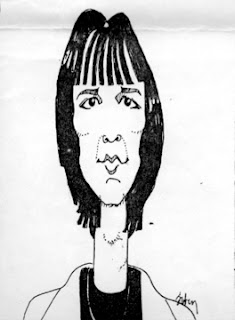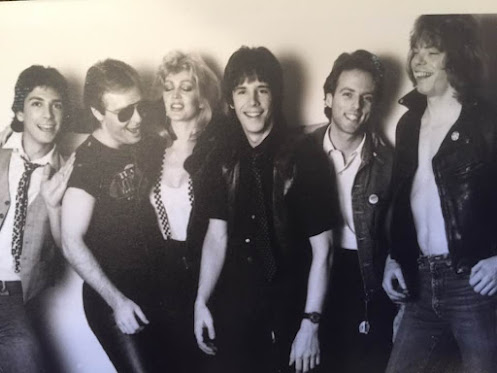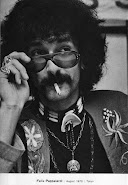by G. Jack Urso
.bmp) |
| Robert Brissette center stage at Studio 8H with the
Hot Hero Band (Summer 1979). |
Hey, Mr. Bass Man!
Photo courtesy R. Brissette.
Robert Brissette (left) was the bassist for the Hot Hero Band and is the lead vocalist on the theme song. I reached out to him and, much to my delight, he agreed to an interview! While I’m not sure Brissette would consider himself a celebrity, the Hot Hero Band has been living rent-free in my head with that theme song for 43 years, so I admit to having some nerves. Not only had Brissette been in the HHB, he also toured and recorded with Columbia Records’ artist Rex Smith and has performed with artists such as Ronnie Spector, hit songwriter Martin Briley, as well as members of Aerosmith, Foreigner, and the Rolling Stones.
Well, I shouldn’t have been anxious. When we spoke on the phone, Brissette’s friendly, funny, and relaxed style immediately put me at ease. Having worked in radio, I interviewed my share of TV, film, and music personalities, so I tried not to act like a fan, but probably did, and Brissette was gracious throughout it all. He later followed up with written responses to my many questions about the band, the show, the music, and his career before, during, and after Hot Hero Sandwich.
Here, Brissette gives us insight into how the band was formed, the theme song arranged, and various production details the band was involved in, as well aa sharing some photos from his career. Brissette continued his career in the music industry after Hot Hero Sandwich, segueing into a long career in entertainment marketing. More recently, Brissette has used his marketing savvy in real estate for Berkshire Hathaway HomeServices, where he was one of the company’s top 16 percent salespeople for 2022. We also get to hear about the Hot Hero Band’s post-HHS incarnation as the NYC-area band 212 and what else Brissette is up to today.
Not that I am
any qualified music critic, but I did play bass back in my younger days — and
admittedly more for the social opportunities than for any inherent musical
talent. While digging through the various music clips, I can’t help but be amazed with Brissette’s fret work. His fingers
dance effortlessly through the scales, though anyone who’s ever played knows it
takes a combination of strength, dexterity, some pretty calloused fingertips,
and countless hours of practice, to lay down those tracks and stay solid on
every beat. After listening to Brissette, one can hear his influences from such
Classic Rock bassists like Chris Squire and John Entwistle, which he discusses
in the interview below.
Well, Hot Hero
Band fans, this has been a long time coming, so let’s check in with Robert
Brissette — the bass man of the Hot Hero Band!
Note: Information provided in brackets are
editorial notes included to provide context for some of the references.
__________________________________________
Pre-Production
Ae13U: When did you start playing the bass? Was that your first instrument? What other instruments do you play (in addition to singing)? Which bassists would you consider most influential on your playing?
Robert Brissette: My first instrument was the ukelele, from there I transitioned to the six-string guitar and took up playing bass following that. Early influences were Paul McCartney and Motown bassist James Jamerson; they still are. Later on, I took to listening to John Paul Jones, Greg Lake, Chris Squire, John Entwistle and whoever played with James Brown.
Ae13U: What sort of work had you done before Hot Hero Sandwich? In a post online, you noted your second job after college was “producing country music talent contests and concerts out of NYC.” Was that where you saw your career going at the time, into producing, promotion, and the marketing side of the industry?
Robert Brissette: I played music professionally for many years, and moved from Atlanta to New York City to do just that. I have a bachelor's degree in marketing and transitioned to that side of the music/entertainment industry. It was the most logical choice for putting my experience as a musician together with my training in marketing.
Ae13U: How did you get hooked up with the Hot Hero Band? Did you audition individually or with the other guys as a group? What was the selection process like? Did Felix Pappalardi have a hand in it?
Robert Brissette: The HHS band came together following the movie Sooner or Later, [aired March 25, 1979 on NBC] which Bruce and Carol Hart played a major role in producing/directing. Rex Smith was the star of the movie. NBC subsequently asked Bruce/Carol to develop a show for 'tweens, and an in-house band was needed. Mark Cunningham played guitar in the movie and was tapped to put a band together. I met Mark through Rex. He had a really good guitar player Richie Annunziato [ed. note: a.k.a. also professionally credited as Rich Steele] and I knew renowned drummer Mike Ratti from my days with Rex. It jelled quickly without too much fanfare; Felix had no involvement.
 |
| "Let it fly in the breeze and get caught in
trees” (Hair): Rex Smith and Robert Brissette (right to left) in the 1970s
Atlanta-Area band Mandala (photo courtesy Robert Brissette). |
Ae13U: While Felix Pappalardi’s role with Hot Hero is noted in various sources, as a band member I’d like to get your thoughts about this influential classic rock musician and producer. For people who are not quite familiar with what a music producer does, what was Pappalardi’s role in this capacity with the band?
Robert Brissette: A producer's role is to manage the creative process, studio recording, song selection, arrangements, mixing process and bring in outside players as the song/session dictates. Felix was a seminal producer from his innovative work with Cream and The Youngbloods (Get Together). For HHS, he directed us in the studio and wrote/co-wrote some of the 'bumpers' and interstitial pieces/underscoring that you hear throughout the show.
Ae13U: Considering Felix’s work in classic rock, a children’s television series seem like an unusual choice. Did he share with you his thoughts about doing the show?
Robert Brissette: Felix was a classically trained multi-instrumentalist who understood music outside of the traditional rock genre. He had the perspective and musical maturity, if you will, to handle something like HHS. A bit of an unorthodox choice, but he had earned our respect, and the chemistry was really great, which counted for a lot.
Ae13U: Did you hear or see much of Felix after the HHS ended and prior to his unfortunate early passing?
Robert Brissette: I saw Felix intermittently following HHS. He produced a band I put together in NYC and was working with us at the time of his demise.
In Production
Ae13U: How did the soundtrack theme come
about?
Robert Brissette: The HHS theme song was given to us on a
cassette. It was nothing more than a middle-age guy (not Bruce Hart) at a piano
singing the melody and lyrics with a discernible New York accent, at least to
my ears. Very bare bones recording by any standard measure, but we knew what to
do with it. We went to the rehearsal studio to begin fleshing it out. Mike
started the drum figure - ideal for a television theme - then I added the bass
line; Mark and Richie came in with the guitar parts. We added the vocal
harmonies and Felix brought it all to life when we recorded it.
Ae13U: What were the weekly musical duties
for the band on the show? In addition to the theme song, you did the bumpers
and cues, and a weekly song, correct? Could you tell us a little bit more about
these, especially the bumpers and cues?
Robert Brissette: The FCC mandated that
shows pitched to young children/'tweens needed 'bumpers' before and after
commercial breaks to let them know the program content was stopping and the
commercial content was beginning. There was a voiceover the drive the point
home. “...Hot Hero Sandwich will be right back following these commercial
messages...”. On the return, “Now, back to Hot Hero Sandwich.” The bumpers and
other pieces had to be exactly in sync with the video it supported. If we
needed a 3.7 second music figure, for example, Felix would often write it, time
it and emphatically direct us when to start/stop. They were
thematically/melodically linked to the show or a particular episode. It was
quite an education to record with such precision.
Bumpers for Hot Hero Sandwich. Voiceovers by
actress Barbara Feldon.
Ae13U: In regards to composing and
arranging the music for the bumpers, cues, and other music, who was
responsible, Felix, Bruce Hart, the Hot Hero Band, a combination of all three?
Robert Brissette: Felix had the lion's
share of composing the pieces, but I'm sure Bruce Hart contributed as well.
There was often a spontaneity to them, done on the spot at the studio.
 |
A classic rock photo of two Classic Rockers, Robert Brissette (left) and Felix Pappalardi (right)
(courtesy of Robert Brissette). |
Ae13U: You mentioned in our phone interview
the band recorded on a Thursday. Did you rehearse in Rockefeller Center or
elsewhere? When did the work week begin for you guys and what kind of hours did
you work?
Robert Brissette: We did the bulk of
the recording at RPM Studio in Greenwich Village. We generally got there at
4:00 pm in the afternoon and left at 6:00 am in the morning. We recorded
all music and whatever song was to be featured on that week's episode. Shows
were taped at Rockefeller Center in Studio 8-H, where SNL is still taped. We
might record on a Tuesday and tape the show on a Thursday.
Ae13U: The band was tight and there seems
like great energy between you guys. Did you know each other at all before the
show?
Robert Brissette: We were a very tight,
very close foursome. I did not know Mark Cunningham too well or Richie
Annunziata at all prior to the show. Mike and I were very close pals. We often
said our jokes, routines, one-liners and ongoing repartee was much more
entertaining than anything on TV at the time.
Ae13U: Sherry Coben and Pat McMahon noted the
band really didn’t get a lot of takes when recording, maybe one or two, yet,
from the clips I have seen, there seems to be great coordination between the
band and the cameras. I’m guessing the NBC crew probably had a lot of
experience shooting live music, but was there a lot of staging that went on
before each take?
Robert Brissette: At Rockefeller
Center, we got two, maybe three takes, all in front of an audience of young
kids assembled for the taping. We went to the makeup room, as does anyone who
appears on TV, to get the proper skin tone for the cameras. Between takes, one
of the women would come out and touch up spots she felt needed freshening. The
camera crew were all veteran guys with years of experience and great stories of
their own.
Ae13U: What was your instrument set-up for Hot Hero? What kind of bass did you use,
effects pedals, speakers, etc., did you prefer?
Robert Brissette: I played a
Rickenbacker 4001 bass for most of the shows, along with candy-apple red Fender
Precision bass. No effects or enhancements. We played to the track we had
recorded two days earlier. Amps were really just visual props for effect.
 |
Caricature of
Brissette by Hot Hero Sandwich writer
Sherry Coben that hung on the halls backstage at Studio 8H along with those of other
band members in the Summer of 1979.
|
Ae13U: Based on the clips available online,
you take center stage and took the lead on many of the vocals. Were say you
were the Hot Hero Band “front man,” so to speak? Did Felix decide that or did
it more naturally evolve?
Robert Brissette: I never considered
myself the front man; it simply evolved that I sang a lot of the songs.
Ae13U: For a little historical perspective
for audiophiles, what kind of multi-track recording equipment did the studio
use? At the time, as far as I understand, up to 32-track recording equipment
was available using 2-inch tape. What was used at the studio you recorded at?
Robert Brissette: I'm not an audiophile,
so I cannot accurately weigh in on that. Our engineer was a very accomplished
guy in his own right, Ed Stasium, who was a magician at the board [ed. note: see edstasium.com for more information]. Richie could
probably speak to this much more than I can. It was two-inch tape.
Ae13U: Did any of the musical quests
perform “live” or was that just too complicated and time consuming for the
show’s production constraints?
Robert Brissette: All musical guests
played to track, i.e., lip synced. A live-music production would have been
nearly impossible, and the best way to ensure a quality sound was to have the
song in the can and have performers go through the motions.
Keith Richards, Robert Brissette, and Ron Wood during Brissette’s post-Hot Hero career.
Post-Production Notes
Ae13U: After Hot Hero, the band stuck together as 212 [ed. note: pronounced “two-one-two”] and performed in the NYC/New Jersey area. How long did you perform together? Where there any other band members besides the original four during this time? Did you keep the same sound as 212 as you did as the HHB, or freed from network constraints, how did your music evolve? Did you perform covers or originals and any recordings as 212?
Robert Brissette: The 212 band played shows in the greater New York area. A lot of people knew us from HHS; there were no other players than us. We played original tunes and maybe performed “Get Together,” the well-known Youngblood's song that Felix actually produced, every now and then. Our original stuff came from the various influences we all had. The song “Promises,” which we performed on Show #6 if I recall, was written by Mark Cunningham and a singer he worked with prior to HHS. Not sure whether I could get my hands on any of our recordings.
The Hot Hero Band performing “Get Together.”
Ae13U: Did Felix Pappalardi have any involvement with 212, or was his involvement just with the show?
Robert Brissette: Felix's involvement was confined to the show. I believe he came to see us from time to time in NYC.
Ae13U: NYC in the late 70s and early 80s was an exciting time to be young and in a band. Can you give us a peek behind the curtain and discuss some of the band and venues 212 ran across at that time?
Robert Brissette: We played a number of the big rock clubs in the area - Tramps, Gildersleeves, The Ritz and various outdoor venues as well. We ran into bands like Foreigner, Aerosmith, Eddie Money, Joe Jackson, Little River Band, Joan Jett and others [ed. note: Eddie Money, Joe Jackson, and the Little River Band, also played on HHS].
Ae13U: Any idea who might still have the rights or the master tapes to all those Hot Hero Band recordings? I know there is a company [Retro Video Inc.] that sells footage from Hot Hero Sandwich (and many other series) including the musical performances, but I’m guessing NBC still owns all those rights. Can you give any insight into all this?
Robert Brissette: With respect to the rights to the shows, NBC would own the exclusive rights to the video content. Any music performed on the show would be part of a separate copyright/licensing arrangement as dictated by the label that owns the master recording.
 |
| Robert Brissette (center) also played in a band that featured model and 1979 Penthouse Pet of the Year Cheryl Rixon (left) (photo courtesy Brissette). |
Ae13U: In an article you posted online, you noted you worked in the entertainment marketing for many years. Can you tell us a little bit about what you did, who you worked for, and who you worked with?
Robert Brissette: EMCI/Rockbill was the premier entertainment market company in the US, and we worked with Fortune 500 clients and top-name artists putting strategic alliances together, including Sprint/Rolling Stones; Discover Card/Ringo Starr; Honda Scooters/Sting; Sears/Phil Collins; Gitano/Shania Twain; Pepsi/Michael Jackson, Rod Stewart, Tina Turner, Lionel Richie and many others. I was VP Event Marketing and helped sell-in and activate the deals we negotiated. I traveled on most of the tours and met artists and clients alike on a regular basis.
Ae13U: You’re still active in the music scene in the New York City area with the band, Twist Of Fate. Can you tell us a little about that? How long have you been involved and how would you describe the band’s sound?
Robert Brissette: I have played in a very popular band, Twist Of Fate, for nearly sixteen years. We have a big following in Westchester County, our home base, and pride ourselves on our repertoire and lively presentation. We rehearse weekly, play often and have over 150 songs on our list. Band has guitar, bass, drums, steel drums, fiddle/violin and sax. By virtue of that atypical configuration, we have a sound that no other band has. Twist Of Fate has a Facebook page and a website: www.twistoffatemusic.com. __________________________________________
A very special thanks to Robert Brissette on behalf of all Hot Hero Sandwich fans for his gracious participation in this effort to document the series and give us a backstage pass look for the Hot Hero Band. There will be more interviews with other Hot Hero Band members, so stay tuned!
● ● ●
UPDATE: The Hot Hero Sandwich Project has moved to its new home at www.hotherosandwich.com. All new posts after July 2024 will be posted only to www.hotherosandwich.com.






.bmp)







